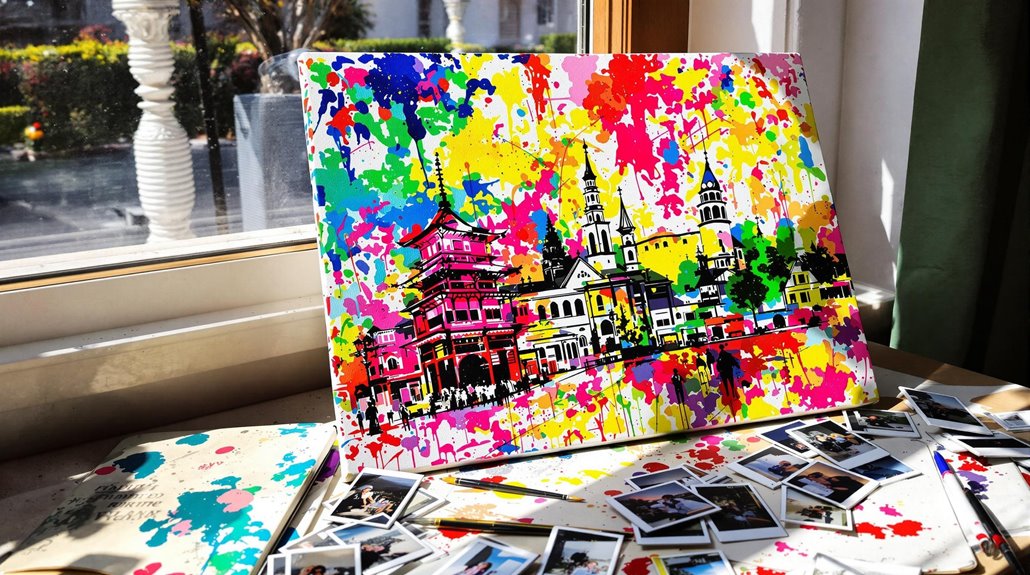Don't let reverse culture shock knock you off your feet! You've got this with nine powerful strategies: Give yourself time to process, stay connected with your international squad, practice self-care like a boss, share stories with fellow travelers, bring your host culture home, seek support from returnees, channel emotions into creativity, maintain those meaningful cultural habits, and rock your new global perspective on home life. Let's explore these game-changing tactics to make your shift smooth and enriching.
- Key Points
- Give Yourself Time to Process the Transition
- Stay Connected With Your International Community
- Practice Self-Care During the Adjustment Period
- Share Your Experiences With Others Who Understand
- Incorporate Elements of Your Host Culture at Home
- Seek Support From Fellow Returned Travelers
- Channel Your Mixed Emotions Into Creative Outlets
- Maintain Cultural Habits That Resonated With You
- Embrace a New Perspective on Your Home Culture
- The Last Word
Key Points
- Maintain connections with international friends through regular video calls and social media to preserve cultural ties and shared experiences.
- Keep a reflective journal to document your readjustment process, emotional fluctuations, and cultural observations during the transition period.
- Join study abroad alumni groups and cultural organizations to connect with others who understand reverse culture shock.
- Integrate elements from your host country into daily life through food, décor, music, and cultural practices.
- Accept that adjustment takes time and follow the natural W-curve of readjustment, which typically spans 3-4 weeks.
Give Yourself Time to Process the Transition

While diving back into your home culture might feel like belly-flopping into an ice-cold pool, don't rush to normalize everything at once.
The typical W-curve of readjustment comes with its own timeline – expect about 3-4 weeks of feeling like a fish out of water.
Understanding your psychological responses can help you better navigate this challenging transition period.
You'll swing between honeymoon highs and culture shock lows, and that's perfectly normal. Instead of white-knuckling through the adjustment, grab a journal and track your emotional rollercoaster.
Those waves of missing your host country while simultaneously craving home? They're all part of the process.
Active reflection will fast-track your adjustment, but passive waiting just drags out the discomfort.
Set realistic expectations – you're not failing if you're not instantly back in sync. Consider joining a study abroad alumni group to connect with others who understand your experience.
Stay Connected With Your International Community
Just because you're back home doesn't mean your global connections need to fade into distant memories. Keep your international experience alive by actively engaging with fellow returnees and building lasting networks.
- Join online forums and Facebook groups dedicated to study abroad alumni – you'll discover kindred spirits who understand exactly what you're going through.
- Organize local meetups with other returnees in your area to share stories, reminisce, and plan cultural activities.
- Take advantage of your university's alumni platform to maintain global connections and discover professional opportunities.
- Get involved with multicultural campus organizations to stay immersed in international perspectives.
Consider becoming a student mentor to help guide others who are planning to study abroad.
Establish regular video calls with friends you made abroad to maintain strong emotional bonds.
Don't let those meaningful relationships slip away! Participate in reunion events, mentorship programs, and cultural exchange activities.
Stay connected and keep your global experiences alive through reunions, mentoring, and cultural activities. Your international bonds matter.
Your international network isn't just a memory – it's a lively community waiting to welcome you back.
Practice Self-Care During the Adjustment Period

Because reverse culture shock can feel like an emotional rollercoaster, taking care of yourself during this change is absolutely essential.
Don't fight those jumbled emotions – embrace them! Pull out your journal, let those feelings flow, and remember it's perfectly normal to feel a bit off-kilter right now. Just like pre-travel preparation helps with departure anxiety, acknowledging your feelings helps with re-entry.
Your daily routine will be your new best friend. Create a schedule that rocks your world – mix calming activities with energizing ones, and don't forget to squeeze in those hobbies you love.
Need to chill? Try meditation, yoga, or simply take deep breaths when things get overwhelming. Your body deserves some TLC too – stick to regular sleep schedules, find fun ways to stay active, and fuel yourself with good food. Remember that mindfulness and meditation can be powerful tools to help you find clarity during this challenging transition period.
Share Your Experiences With Others Who Understand
Everyone needs a squad who truly gets it – those who understand the surreal feeling of straddling two worlds after returning home.
Finding your tribe of fellow returned travelers isn't just therapeutic – it's essential for processing your transformed worldview. The longer you stayed in your host country, the more you'll benefit from connecting with others who understand that deeper adaptation makes coming home harder. Understanding how to articulate your experiences effectively can help others relate to your journey.
- Join international clubs and meetup groups in your area to connect with globally-minded souls who speak your language of cultural comparisons and "that one time abroad" stories.
- Enjoy study abroad alumni networks where you can swap tales of reverse culture shock and transformation.
- Create content through blogs, vlogs, or podcasts to share your journey and attract kindred spirits.
- Schedule regular video calls with your international friends who lived through the same experiences – they're your built-in support system for steering through this change.
Incorporate Elements of Your Host Culture at Home

While your physical journey abroad may have ended, your cultural adventure doesn't need to stop at your doorstep. Transform your living space into a lively fusion of your host culture and home traditions.
Hang those richly patterned textiles you collected as wall art, or drape them over furniture for an instant cultural touch. Create dedicated spaces for meaningful rituals – perhaps a cozy tea corner with authentic ceramics or a meditation nook adorned with symbolic elements. Focusing on a neutral color backdrop will help your cultural pieces truly shine.
Transform ordinary corners into cultural sanctuaries with collected textiles and mindful spaces that honor cherished traditions and memories.
Don't just stash your travel treasures in a box! Display traditional instruments, artwork, and ceremonial objects where you'll interact with them daily.
Mix patterns and textures strategically – pair minimalist furniture with ornate accents, or blend traditional motifs with modern designs. Your home should tell the story of your journey and keep those cherished experiences alive.
Seek Support From Fellow Returned Travelers
Coming home doesn't mean you have to process your transformative experiences alone! Connecting with fellow returned travelers who "get it" can make your shift smoother and more meaningful.
These kindred spirits understand exactly what you're going through and can offer invaluable support. Many travelers experience reverse culture shock when returning home after extended time abroad. Taking time to adjust to cultural differences can ease your transition back home.
Here's how to find your tribe of global adventurers:
- Join alumni networks through dedicated Facebook groups and WhatsApp chats
- Organize local meetups and potluck dinners to share stories and cultural dishes
- Participate in online forums where you can share insights and answer questions
- Connect with mentorship programs to guide future travelers while processing your own experience
Don't underestimate the power of community – these connections can help you integrate your international experiences into your new normal while keeping your global perspective alive.
Channel Your Mixed Emotions Into Creative Outlets

Raw emotions after returning home can feel like a jumbled masterpiece waiting to take shape.
Why not transform those complex feelings into something beautiful? Grab a journal and pour your thoughts onto paper, crafting your repatriation story one page at a time. You'd be amazed how therapeutic it can be.
Let your creativity run wild – snap photos of familiar streets with your newly global perspective, compose music that blends your host country's rhythms with home sounds, or whip up fusion dishes that marry both cultures.
Start a blog to share your journey, or channel your experiences into visual art that captures the essence of straddling two worlds. Remember that feeling disconnected from home is a natural part of the repatriation process.
These creative outlets aren't just hobbies – they're powerful tools to process your change and celebrate your transformed worldview. Starting a blog can help you develop professional skills while preserving precious memories from your time abroad.
Maintain Cultural Habits That Resonated With You
Just because you've returned home doesn't mean you need to abandon those beautiful cultural habits you embraced abroad. Your time overseas has transformed you, so own it!
Keep those meaningful traditions alive by weaving them into your daily routine. Finding ways to preserve your connections with people from your host country helps combat feelings of isolation and loneliness. The personal growth you experienced abroad becomes a lifelong asset as you integrate these practices.
Embracing cultural traditions isn't a temporary vacation souvenir – it's an opportunity to enrich your daily life with newfound wisdom and perspective.
- Turn your living space into a cultural haven with artwork, photos, and artifacts that transport you back to your host country.
- Maintain those language skills through podcasts, movies, and regular chats with friends abroad.
- Host cultural dinner parties where you can share authentic recipes and stories from your time away.
- Join local cultural organizations or meetup groups to connect with others who share your passion.
Mix and match these practices with your home culture – you're not just preserving memories, you're creating an exciting new lifestyle that reflects your expanded worldview.
Embrace a New Perspective on Your Home Culture

Your time abroad has equipped you with a powerful superpower: the ability to see your home culture through fresh eyes.
Don't waste this unique perspective – use it to critically examine and understand your native environment in ways you never could before.
Notice how your hometown's pace of life, social norms, and daily routines suddenly appear different.
Challenge yourself to analyze local media, politics, and social structures with your newly acquired international lens.
You're now part of an exclusive club that can navigate multiple cultural frameworks simultaneously.
Consider keeping a reflective journal to process your evolving cultural insights and perspectives.
Transform this awareness into action by hosting cultural exchange discussions, documenting your comparative observations, and blending your favorite foreign practices into your daily life.
You're not just returning home – you're bringing back a more sophisticated, nuanced understanding of your own cultural identity.
The Last Word
Coming home might feel like trying to fit a square peg in a round hole, but you've got this! By embracing these nine strategies, you'll navigate reverse culture shock like a pro. Keep dancing to your international rhythm while rediscovering what makes home special. You're not just returning – you're bringing back a worldly perspective that'll transform your daily life into an exciting fusion of old and new.

